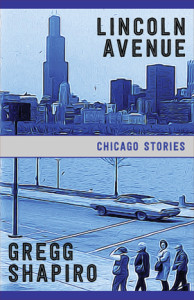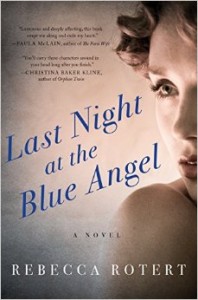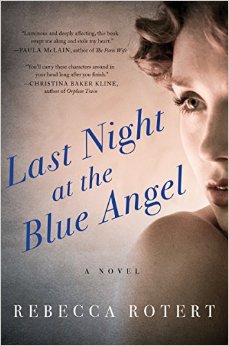 Lincoln Avenue: Chicago Stories
Lincoln Avenue: Chicago Stories
by Gregg Shapiro
Squares & Rebels. 100 pages, $14.95
 Last Night at the Blue Angel
Last Night at the Blue Angel
by Rebecca Rotert
William Morrow. 334 pages, $25.99
WHEN I WAS growing up in Evanston, Illinois, Chicago’s Lincoln Avenue intrigued me because it was one of those streets off the actual grid. It coursed through the city at an odd diagonal and confused me, though I often drove my mother’s Pontiac Le Mans along it, especially on a Friday or Saturday night. Some of the characters in Gregg Shapiro’s new collection of short stories, Lincoln Avenue, seem to favor AMC Hornets and Oldsmobile Cutlass station wagons for their forays.
Regardless of the make of vehicle, though, the farther away the avenue got from the suburbs and the closer it came to Chicago’s Lincoln Park, the more alluring the route became. For in the mid and late 1970s, many of the city’s gay bars, places like the Broadway Limited and Center Stage, could be found along it, with others at crucial intersections, particularly where Lincoln crossed Halstead and Clark streets. Many a weekend night, I would lead my tolerant pack of straight high school friends into some of these bars, pretending I didn’t know the venues were gay. It would often take a few minutes before my friends figured out what kind of place they were in, at which point they would insist on leaving even before finishing their beers. I would feign surprise at my mistake.
So, for someone who grew up in virtually the same suburban and urban landscape as Shapiro, and at the same time, the stories he tells in his new collection resonated strongly. In “Lunch With a Porn Star,” the narrator is on a northbound El train when he spots a famous actor named Billy Bigg. Eventually the narrator summons up the courage to invite Bigg to join him at lunch in the Loop. As the two sit with their orders of take-out Chinese, the reader eagerly awaiting the action to come, the scene suddenly stops the moment they unfold their napkins. End of story.
In “Swimming Lessons,” a gay high school boy is enrolled by his parents in a beginner’s class at the local suburban YMCA—though he’d rather be throwing pots in a ceramics class. But when Paul, the young swimming instructor, walks in wearing “a green racing suit, the same color as Robin’s on Batman [though]Paul filled out the front better,” the boy is relieved and ready to learn the crawl stroke. But before either of them gets wet, the story goes dry. No diving, no stroking, no sucking in and blowing out.
Shapiro sets up his stories well—though many read like personal essays—and his mostly first-person narrators engage us the moment we meet them. But Shapiro has a maddening tendency to stop the action in every story just as it begins to pick up speed. This collection feels more like the beginnings of stories yet to be completed. We keep getting stuck at red lights along Lincoln Avenue, though we know there’s more action ahead.
Rebecca Rotert’s novel, Last Night at the Blue Angel, takes place a decade earlier and in what feels like a much different Chicago. Like most mature American cities in the mid-1960s, Chicago was literally tearing itself apart. Its greatest buildings and most distinctive streetscapes were being lost. “I tell … the whole story of Chicago wrecking all its best buildings,” says Jim, one of the characters in the novel, a man hopelessly in love with Naomi Hill, a bisexual female nightclub singer. He moonlights as a photographer documenting the demolition of Chicago’s architectural legacy, a metaphorical reference to his own fragility. “I’m talking about Adler and Sullivan, Frank Lloyd Wright, Burnham and Root. They’re the ones put Chicago on the map,” he states.
Jim is as obsessed with the impending destruction of Louis Sullivan’s Chicago Stock Exchange as he is with Naomi, who remains as emotionally distant as one of that building’s sculpted vines scrolling atop a cornice. It makes sense that Jim seeks to document the building in his photos, for it may be the most architecturally important structure to have been lost in Chicago. I was a young teenager in 1972 when the bulldozers had finally accomplished their task and, being the nerd that I was, I canvassed my neighborhood with a petition to try to save the Exchange at the last hour. When I asked for a signature from my ninety-year-old cousin Eva, who had worked there as a young secretary, she said with disdain, “That building felt old and dark even then.” But there’s a problem in the setting of the demolition of the thirteen-story masterpiece, which assumes the presence of a character in Rotert’s novel: the author places its destruction in 1965, seven years before its actual demise. Rotert explains this poetic license in an Author’s Note. But should facts be this malleable?
Not unlike Chicago in that turbulent era, Naomi Hill, the singer at the heart of the novel, is highly self-destructive. As a teenager in the 1950s, she falls in love with a female classmate in her small Kansas town and is driven out when their affair is discovered. She hitches a ride to Kansas City, where her nascent talent as a sultry nightclub singer is discovered. After an affair with the club’s owner, the brother of the girl she loved back home, she moves to Chicago, spirited there with the aid of a pod of lesbian nuns.
She gives birth to Sophia, whom the reader meets as a precocious tween living with her mother in a down-at-the-heels downtown hotel. Some nights, Sophia awakens to a room-service breakfast with a strange woman joining her at the table; other mornings, it might be a man her mother has brought home. Once homework is done, she faithfully watches her mother from the wings at every performance at the Blue Angel where, after her mother takes her bows, Sophia says, “I run to her, hug her, my face pressed into tulle and sequins, steam coming off her like a racehorse.” When Naomi’s audiences start to dwindle, she reassures her daughter and herself by declaring, “It just doesn’t matter how small a crowd is, so long as they adore you.”
But if she’s adorable on-stage, off-stage she’s self-absorbed, indiscreet, and prone to drama and overuse of the word “darling,” as if she’s some low-rent Mame. When a man she loves proposes to her, offering her a new suburban domestic lifestyle, she whines, “How much I feared such a life, a normal life. … I feared becoming invisible again, powerless, dependent. I wanted to do the right thing but I wanted something else more. To be known. To be loved.” Like many a star, Naomi is more fun on stage than off.
David Masello is a widely published essayist and poet based in New York City.






